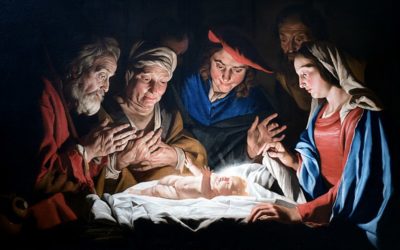The month of November 1831 proved to be an important one in which members met in conference and made key decisions, such as officially publishing the revelations of Joseph Smith for the first time. Record-keeping, something that had been commanded on the day the Church was organized, also took a step forward with a revelation on the role of the historian and recorder in the Church.
Doctrine and Covenants 67
On November 1 and 2, 1831, an important conference was held in Hiram, Ohio. According to the minutes of the conference, those present voted to print the revelations as a book in a run of ten thousand copies, which would have been a huge order for the Church’s press in Independence, Missouri. The number was later cut to three thousand.
The Book of Mormon, which was published the previous year, included the testimonies of the Three Witnesses and the Eight Witnesses, and at the November 1831 conference, “Br. Joseph Smith jr. said that inasmuch as the Lord had bestowed a great blessing upon us in giving commandments and revelations, asked the conference what testimony they were willing to attach to these commandments which should shortly be sent to the world. A number of the brethren arose and said that they were willing to testify to the world that they knew that they were of the Lord.” After this, according to the minutes, a revelation was “received relative to the same.”
The revelation mentioned in the minutes may have been one of two documents surviving today. It may be the text signed by witnesses to the compiled book of revelations. Or it may be what is now known as section 67 of the Doctrine and Covenants.
For more on the history of this section, click here.
Both documents pertain to how we relate to the revelations that come through prophets. In Joseph Smith’s day, the Church was small, and many Church members knew the prophet personally. As with the Book of Mormon, which contains a promise that all can know for themselves its truth (Moroni 10:3‒5), Joseph desired for others to receive their own testimony of the revelations that came through him.
Revelation is sometimes dramatic but often quiet, and in the noisy world in which we live, it can be easy to miss. Section 67 is important because in it, the Lord explains how to receive revelation.
To those who struggled to received a testimony of the revelations, the Lord replies that He heard their prayers and offered an answer, but “there were fears in your hearts, and verily this is the reason that ye did not receive” (verses 1‒3).
The Lord offered a simple way to get their own “testimony of the truth of these commandments which are lying before you” (verse 4). Knowing Joseph personally and recognizing his lack of formal education and backwoods language, the Lord said:
“Your eyes have been upon my servant Joseph Smith, Jun., and his language you have known, and his imperfections you have known; and you have sought in your hearts knowledge that you might express beyond his language; this you also know. Now, seek ye out of the Book of Commandments, even the least that is among them, and appoint him that is the most wise among you; or, if there be any among you that shall make one like unto it, then ye are justified in saying that ye do not know that they are true.” (Verses 5‒7.)
In other words, the Lord said, see if you alone can duplicate what the weak Joseph was able to do with God’s help. If you can do it, then fine, you don’t have to say that they’re true. “But if ye cannot make one like unto it,” the Lord said, “ye are under condemnation if ye do not bear record that they are true” (verse 8).
Besides, “all things which are good cometh of God,” the Book of Mormon taught (Moroni 7:12; Alma 5:40). And as for the revelations to be published in the Book of Commandments (later called the Doctrine and Covenants), “ye know that there is no unrighteousness in them,” the Lord said, “and that which is righteous cometh down from above, from the Father of lights” (Doctrine and Covenants 67:9).
If you can grow spiritually to the point of understanding this much, then the Lord has much more in store for you. “And again, verily I say unto you that it is your privilege, and a promise I give unto you that have been ordained unto this ministry, that inasmuch as you strip yourselves from jealousies and fears, and humble yourselves before me, for ye are not sufficiently humble, the veil shall be rent and you shall see me and know that I am—not with the carnal neither natural mind, but with the spiritual” (verse 10).
That will require purification but is possible. “For no man has seen God at any time in the flesh, except quickened by the Spirit of God. Neither can any natural man abide the presence of God, neither after the carnal mind.” (Verse 11‒12.)
But in time, it can happen if you continue to grow in faith and purity. “Ye are not able to abide the presence of God now, neither the ministering of angels,” the Lord acknowledged, “wherefore, continue in patience until ye are perfected. Let not your minds turn back; and when ye are worthy, in mine own due time, ye shall see and know that which was conferred upon you by the hands of my servant Joseph Smith, Jun.” (Verses 13‒14.)
Doctrine and Covenants 68
During the November 1831 conference, four men asked Joseph Smith to inquire of the Lord regarding His will for them. The four were Orson Hyde, Luke Johnson, Lyman Johnson, and William E. McLellin. Following their request, Joseph received the revelation that is now section 68 of the Doctrine and Covenants. It addresses the specific duties of these four men and those of elders and church members generally.
For more on the history of this section, click here.
The revelation begins by addressing Orson Hyde and his duty to preach the gospel but points out that the principles provide “an ensample unto all those who were ordained unto this priesthood, whose mission is appointed unto them to go forth” (verses 1—2).
Each person who preaches is to “speak as they are moved upon by the Holy Ghost.” If they do so, “whatsoever they shall speak when moved upon by the Holy Ghost shall be scripture, shall be the will of the Lord, shall be the mind of the Lord, shall be the word of the Lord, shall be the voice of the Lord, and the power of God unto salvation” (verses 3—4).
If they did not fear but were “of good cheer,” the Lord promised to be with them, “and ye shall bear record of me, even Jesus Christ, that I am the Son of the living God, that I was, that I am, and that I am to come” (verses 5—6).
He promised Orson, the other missionaries, and “all the faithful elders of my church” that if they went forth preaching and baptizing, signs would follow, and they would also recognize “the signs of the coming of the Son of Man” (verses 7—11).
Much of the rest of the revelation is “in addition to the covenants and commandments,” or basic rules of the Church at that time (verse 13). The verses described the office of bishop to the new Church in some detail (verses 14—24) and gave instructions to parents on teaching their children the basic principles and ordinances of the gospel (verses 25—26), having their children baptized at age eight (verse 27), and teaching them to pray and “walk uprightly before the Lord” (verse 28).The Saints were also commanded to keep the Sabbath holy (verse 29), work hard to avoid idleness and greed (verses 30—32), and attend to their prayers (verse 33).
Doctrine and Covenants 69
The revelation that is now section 69 of the Doctrine and Covenants focuses on two related duties: (1) publishing the scriptures (specifically the Book of Commandments) and (2) keeping the history of the Church. From the beginning of the Church, those responsible for recording and preserving scripture documents were the clerks and historians. In this revelation, the Lord sends Oliver Cowdery (the Church’s first historian and scribe for the Book of Mormon and other scripture) to Missouri with John Whitmer (the Church’s second historian and another scribe for the Book of Mormon and revelations).
The two are to carry “the commandments”—that is, the records containing the revelations—to Missouri (verses 1—2). John, the current historian, should “continue in writing and making a history of all the important things which he shall observe and know concerning my church,” with counsel from Oliver and others (verse 3—4).
Church members “who are abroad in the earth” are then to “send forth the accounts of their stewardships to the land of Zion,” which is to be “seat and a place to receive and do all these things” (verses 5—6). In other words, the Church’s historical archive (what today we call the Church History Library) is to be established there.
But to fulfill his duty as historian, John Whitmer was also commanded to “travel many times from place to place, and from church to church, that he may the more easily obtain knowledge—preaching and expounding, writing, copying, selecting, and obtaining all things which shall be for the good of the church, and for the rising generations that shall grow up on the land of Zion, to possess it from generation to generation, forever and ever” (verses 7—8). This is a duty Church Historians fulfill to this day.
For more on the history of this section, click here.
Doctrine and Covenants 70
The Church’s historians and recorders, of course, were to work under the direction of the prophet and other leaders. The revelation that is now section 70 of the Doctrine and Covenants gave the stewardship for scripture publication to Joseph and others, including William W. Phelps, the Church’s printer (verses 1—5). As with other stewardships in those days, they were to use any proceeds from the publication to cover their necessities, with the balance to be consecrated to help build Zion in other ways as well (verses 6—8). Thus, whether a Church leader or an ordinary member, all were to operate under the law of consecration, receiving a stewardship for their support and giving the balance to the Church.
“Behold, this is what the Lord requires of every man in his stewardship, even as I, the Lord, have appointed or shall hereafter appoint unto any man,” the revelation directed. “And behold, none are exempt from this law who belong to the church of the living God.” (Verses 9—10.)
If everyone fulfilled his or her stewardship, there would be great equality and prosperity as there was after Christ’s visit to the Americas (see 4 Nephi 1: 3—23). In other words, they would become a true Zion people.
If, however, the people gave “grudgingly,” the Lord warned in the revelation, “the abundance of the manifestations of the Spirit shall be withheld” (verse 14).
For more on the history of this section, click here.
(Credit for image at top of post: Stock image from depositphotos.com.)



